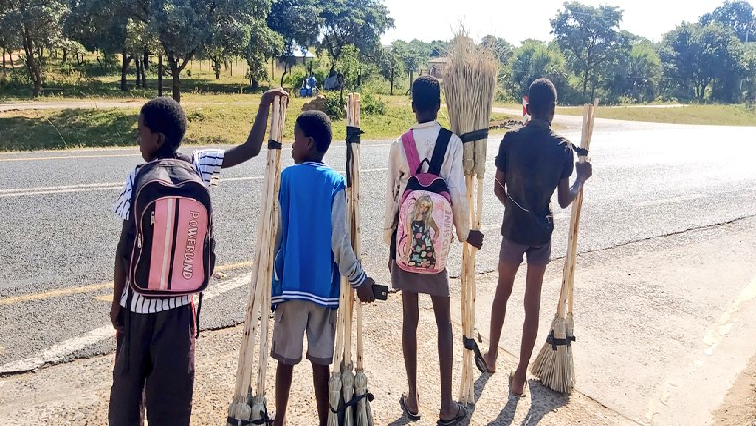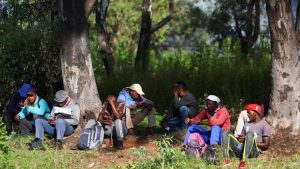Poverty is forcing children from one family on the KwaZulu-Natal North Coast to hitchhike over a hundred kilometres to sell hand-made brooms in Richards Bay so that the family will have food to eat. The Ndlazi family of Hluhluwe is one of over 7 000 households in the province that goes hungry.
South African Child Gauge’s 2019 study found that over a third of child hunger in South Africa occurs in KwaZulu-Natal. The study on poverty and over-population found that these figures are only partially explained by the fact that KwaZulu-Natal is the second most populous province in the country.
Twenty-six children and grandchildren live with 60-year old Getty Ndlazi in her RDP house at Hluhluwe. Most of the 19 grandchildren are not old enough to go to school yet.
Recently a video went viral on social media after someone stopped two of these young children while they were selling hand-made brooms in Richard’s Bay. In the video, the young boys say they are selling these brooms to buy mealie meal so that their family does not go hungry.
When a video on social media went viral of two young boys selling homemade brooms to make money to take back home and feed the family. The #sabcnews visited the village to assess the severity of their plight. What we found was severe poverty and an over-populated family. pic.twitter.com/4Lo4Kv2Dvx
— Jayed-Leigh Paulse (@JayedLeigh) May 22, 2021
After seeing the video of the two boys, SABC News went to visit the home of Gogo (Grandmother) Ndlazi. She was surrounded by her 19 grandchildren, teaching the older ones how to make the straw brooms.
The children’s ages range between a few months and 16 years. Gogo Ndlazi started making brooms when her husband passed away in 1987.
The children here do not know what playing is. Once you are old enough to hold a knife and carve wood, you are taught the ropes of the business.
Gogo Ndlazi says some of her grandchildren hitch-hike on Fridays after school from Hluhluwe to Richard’s Bay, a 100-kilometre trip, to sell the brooms. She says they sleep at a garage when they do not make enough money to get back home.
In total, 27 members of the family occupy and – call this modest RDP home. Once you old enough to hold a knife and carve wood, you are taught the ropes. #sabcnews pic.twitter.com/qDnIIFLS1Y
— Jayed-Leigh Paulse (@JayedLeigh) May 22, 2021
“Their parents are not working, so when they run short, I take money from the profit that I get through selling brooms. On Fridays, when they come back from school they eat and then go to sell the brooms. They leave on Friday, sleep over at the garage and come back the following day. They sell in Richard’s Bay. They sleep at the garage and then continue selling in the morning and come back home.”
The children hide their money purses under their clothes. Gogo Ndlazi says she hardly sleeps at night when her grandchildren are away, although she gives them two cell phones to stay in contact.
“It’s painful to sleep knowing that my children are sleeping in the open. I keep contacting them over the phone. I experience sleepless nights because I know that they might be in danger. It’s hard because these are young children.”
At the homestead, the older siblings travel far distances to sell the brooms travelling from Hluhluwe to Richards Bay. It is a 3 hour journey away from home. They often look for a safe place to sleep overnight. For more on this story watch #sabcnews pic.twitter.com/e2fLjYMi4q
— Jayed-Leigh Paulse (@JayedLeigh) May 22, 2021
Gogo Ndlazi says the family rely heavily on child support grants to buy food. Sometimes when food runs low, Gogo Ndlazi she would let the children eat first and go to bed hungry herself.
“When my children receive their child support grant one buys 80 KG maize meal, another one buys maybe 25 KG of beans. They decide amongst themselves what to buy in the grocery. This grocery sometimes lasts for only two weeks. then I add with my profit. They also contribute towards the scholar transport for their children.”
A 13-year-old girl who also occasionally sleeps at the garage says their journey is filled with anxiety and fear.
“I am 13-years-old. When we are in Richard’s I always get worried because sometimes I can meet a stranger that can rape me. I wish people can bring us food, I wish my uncles can get a job and we also need a house, at the moment we all sleeping in one RDP house.”
Meanwhile, the 15-year-old Fanele Jobe says although they know that they are putting their lives in danger, they have to soldier on to be able to provide for their families.
“Whenever I leave home to sell the brooms in the street I always think about challenges that we often encounter. I always think about our safety at the garage where we normally sleep. Sometimes when we are busy selling, the street kids “amaphara” often ask if we have sold some then we say no, they also ask where we are going to sleep and we tell them that there is a car that will fetch us. Sometimes we find them waiting for us at the garage and the security from the garage looks after us.”
The children are aged between a few months old to sixteen years of age.
She tells me she started making brooms in 1987 to earn an income- when her husband passed on. #sabcnews pic.twitter.com/8KSp15Lprz— Jayed-Leigh Paulse (@JayedLeigh) May 22, 2021
According to the study done by the South African Child Gauge, nearly 57% of South Africa’s children live below the upper-bound poverty line. Given the high unemployment rate, social grants provide an essential safety net for many households, according to South African Child Gauge.
And access to the Child Support Grant has increased dramatically since 1998. For the Ndlazi family, the concern now is selling as many brooms as they can before winter sets in. The winter cold makes an already dire situation even worse.






